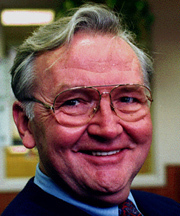
On March 13, 1997, thousands of people in Arizona, Nevada and the Mexican state of Sonora reported the appearance of strangely mobile luminescent formations in the night skies.
Among the witnesses of what soon became known as thePhoenix Lightswas Arizonas governor, Fife Symington, who first ridiculed the credulity of the predictably ensuing throngs of UFO advocatesduring a news conference at which he stood beside an aide dressed in anETcostumebut later admitted that he had, in fact, seen something he thought otherwise inexplicable, observing to a reporter thatthe universe is a big place.Were conceited to think were alone.
Alone or not, we may be forgiven at least a degree of chariness when invited to considerThe X Filesas anything more than light entertainment.Nevertheless, the loony vulgarity of contemporary obsession with extraterrestrial life can obscure the fact that this is an ancient and respectable speculation which has interested even greater and perhaps less credulous thinkers than Gov. Symington for more than two millennia.
Michael Crowe puts it wryly and arrestingly in the preface to his bookThe Extraterrestrial Life Debate, Antiquity to 1915: A Source Book,which recently was published by the University of Notre Dame Press.
Although making no claims about whether or not extraterrestrials exist,he writes,I shall cite evidence to show that they have long since invaded and that their effects can be uncovered by historical research.
Crowe, Notre Dames Rev. John J. Cavanaugh Professor Emeritus in Humanities in the Program of Liberal Studies, is not talking about crop circles and flying saucer wreckage in the New Mexican desert.He is talking about the writings of Aristotle, Lucretius, St. Thomas Aquinas, Galileo, Kepler, Pascal, Newton, Voltaire, Kant, Darwin, and Dostoevsky, to name only a few.
In fact, Crowe argues that the debate over extraterrestrial life is evident throughout Western history and has involved half its most celebrated intellectuals.In other words,already in the premodern period extraterrestrials had made their entrance into terrestrial thought.
One fascinating conclusion Crowe draws from his research regards the 16th century astronomer Nicolaus Copernicus, whom he holds responsible for the extraterrestrial invasion of the modern era.It was the Copernican displacement of the Earth from the center of the universe which unwittinglyopened the door an inchand allowed moderns to imagine a plurality of worlds.
To put the point differently,Crowe writes,the celibate canon of the cathedral in Frauenberg acted in a manner that has left him open to the charge that he is the father, or at least the grandfather, of Darth Vader, ET, Alf, Mork and the whole tribe of extraterrestrials we know so well.
One early and enthusiastic reviewer of Crowes book was Steven J. Dick, director of NASAs history vision, who praised the book for its arrangement of materialnot available anywhere else. . . . Crowes purpose is to let the reader see the original words of the authors who discussed other worlds. . . . Such a source book serves an important purpose, and is ideal for teaching and generating discussion in class. The subject is of increasing importance as we find more and more about the possibilities of extraterrestrial life through current disciplines such as astrobiology, bioastronomy, and the Search for Extraterrestrial Intelligence (SETI).
Indeed, Crowe will be using his new book to teach and generate discussion in the University Seminar course he teaches each fall,The Extraterrestrial Life Debate:A Historical Perspective.
One of my goals in the course is to present the students with the history and present state of one of the great questions we have faced for 25 centuries and that continues to challenge us,Crowe says.I also hope that the students will come to see an approach to this question very different from what sometimes appears in the media, which at times tends to treat this serious topic in a sensationalist manner.
In other words, I hope the students will see that science and scientific method, good, careful scholarship and thought in a variety of disciplines, can provide significant insights into this very complex topic.In fact, I hope they will come to realize that this is true in regard to many other issues, including those that the public learns about chiefly from entertainment TV and popular journals.
Who knew those little green men were so erudite?
_ Contact: Michael Crowe at 574-631-6212 or_ " Crowe.1@nd.edu ":mailto:Crowe.1@nd.edu
TopicID: 29146